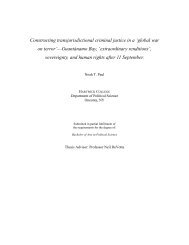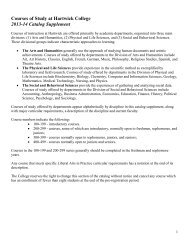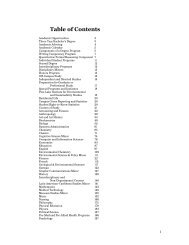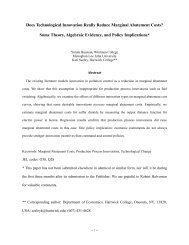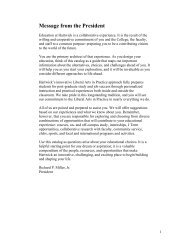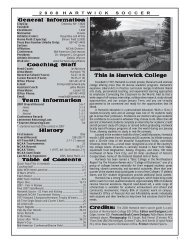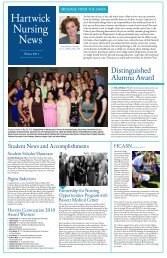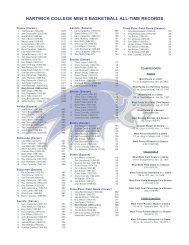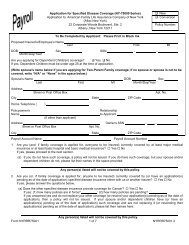Table of Contents - Hartwick College
Table of Contents - Hartwick College
Table of Contents - Hartwick College
You also want an ePaper? Increase the reach of your titles
YUMPU automatically turns print PDFs into web optimized ePapers that Google loves.
Careers are available in several areas for graduates with undergraduate<br />
degrees in geology; however, better opportunities are available to<br />
individuals with a graduate degree. Consequently, capable geology<br />
students at <strong>Hartwick</strong> are encouraged to attend graduate school, and a<br />
number <strong>of</strong> recent graduates have done so. Others are employed in the<br />
energy, mineral and environmental science industries.<br />
Faculty<br />
Eric Johnson, chair; David Griffing; Meredith Newman; Robert Titus<br />
Courses<br />
107 Physical Geology (4 credits, 3 one-hour lectures weekly plus one 1<br />
two-hour lab weekly, one weekend day field trip) Origin, composition, and<br />
structure <strong>of</strong> Earth. Also covers the rock cycle, identification <strong>of</strong> common<br />
minerals and rocks, formation <strong>of</strong> igneous, sedimentary, and metamorphic<br />
rocks, determination <strong>of</strong> rock ages, plate tectonics, local geology, earth<br />
resources, and climate change. (LAB)<br />
108 Historical Geology (4 credits, 3 one-hour lectures, 1 two-hour lab<br />
weekly) A history <strong>of</strong> Earth since its origin. Topics include the origin and<br />
development <strong>of</strong> the continents, the origin and evolution <strong>of</strong> life, the<br />
appearance <strong>of</strong> evolution <strong>of</strong> man, and major climate changes and their<br />
effects on man. (LAB)<br />
109 The Global Environment (4 credits, 3 one-hour lectures, 1 twohour<br />
lab weekly) This course focuses on the whole environment, from the<br />
center <strong>of</strong> the Earth’s core to the top <strong>of</strong> its atmosphere. We examine the<br />
scientific aspects <strong>of</strong> processes thought to be responsible for global change,<br />
with emphasis on interactions between the lithosphere, hydrosphere,<br />
atmosphere and biosphere. Topics include the history <strong>of</strong> global change<br />
from the formation <strong>of</strong> the Earth to the present, the magnitude and rate <strong>of</strong><br />
change, the processes <strong>of</strong> plate tectonics and the physical environment as<br />
driving mechanisms for change, global catastrophes as catalysts for<br />
change, and human intervention and how it affects the rate and<br />
magnitude <strong>of</strong> change. (LAB)<br />
110 Environmental Geology (3 credits, 3 one-hour lectures) This<br />
course is a general survey <strong>of</strong> the role geology plays in the environmental<br />
sciences. A description <strong>of</strong> the major geologic hazards, earthquakes,<br />
volcanoes, landslides, erosion, etc. An introduction to hydrogeology from<br />
the point <strong>of</strong> view <strong>of</strong> water use problems. A discussion <strong>of</strong> energy, mineral<br />
and soil resources. Problems <strong>of</strong> air, soil and water pollution.<br />
202 Meteorology (4 credits, 3 one-hour lectures, 1 two-hour lab<br />
weekly) This course covers the structure and dynamics <strong>of</strong> the Earth’s<br />
atmosphere. Topics include the development and prediction <strong>of</strong> weather<br />
systems, thermodynamics <strong>of</strong> atmospheric stability, and dynamics <strong>of</strong><br />
global climate change. Students will learn to use the <strong>Hartwick</strong> <strong>College</strong><br />
weather station to collect and analyze atmospheric data and use these<br />
data along with forward atmospheric modeling programs (NCAR, NWS)<br />
to construct forecasts.<br />
203 Planetology (3 credits, 3 one-hour classes weekly) This course<br />
covers the geology, chemistry, and physics <strong>of</strong> the sun, planets, meteorites<br />
and moons <strong>of</strong> our solar system. The course focuses on the origin and<br />
evolution <strong>of</strong> the solar system and the geologic development <strong>of</strong> the planets<br />
131



